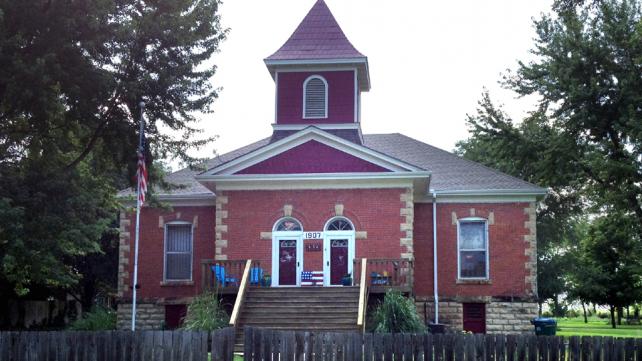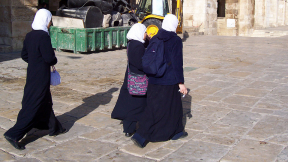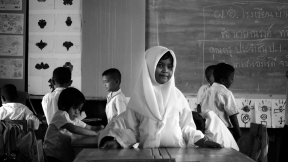
Seven-year-old Zaahirah Abdullah has a passion for nose rings and bellybutton rings, thanks to her friends and a favorite teacher at Pyrtle elementary school in Lincoln, Nebraska.
She's really into style," says her mother Najla Abdullah, who attended the same public school as a child. "I can see I really need to build Islamic fundamentals with her," she adds earnestly in an interview with Sound Vision.
Zaahira's interest in body ornamentation through the influence of friends and her teacher speaks to the power of public schools in shaping the attitudes of most Muslim children in North America.
Zaahirah is one of the 99 percent of Muslim children in the United States who attend public schools. And it's her generation over whom the debate about sending Muslim children to Muslim or public school currently rages.
Better environment in Muslim schools
The strongest argument in favor of sending children to Muslim schools is the presence of an Islamic environment. Muslim kids in most of these schools pray, interact with other Muslim children in classes and during breaks. They also generally have less exposure to sex, drugs, alcohol and violence. In addition, Muslim schools are a place to build identity and security.
"Had one [a Muslim school] been available in the city, they would definitely have sent me," says Abdullah of her parents. "I think they would definitely have wanted me to have that sense of camaraderie, and that strength of people around you who are of the same faith and are there to support [you]."
"A Muslim school is the only place where they [Muslim kids] will ever have the chance to develop an identity that says, "Hey, these are my people. I belong to an identifiable community,'" writes New-York based Muslim school teacher Yahiya Emerick in an e-mail interview with Sound Vision. He has worked full-time in two Islamic schools, one in Michigan and the other in New York. He has also authored the book The Complete Idiot"s Guide to Understanding Islam.
Muslim schools give students a sense of self-worth, pride and cultural identity they could never get in a public school, said Sharifa Alkhateeb, president of the Muslim Education Council in Virginia. The organization educates educators and administrators about Islam, Muslims, Muslim families and Middle Eastern culture.
A sense of identity comes not just from being with other Muslim kids but also with the memories of praying, hearing the Adhan and discussing Islamic issues. For the child, "that's invaluable," Alkhateeb noted.
The perception of Muslim schools as "holding tanks"
"What usually happens is that when Ahmad Doe realizes his kid is turning into a foul-mouthed wretch with bad values and such, they look for a quick fix and toss him in an Islamic school. In one school I worked in, fully a third of the kids fit this description," writes Emerick.
This is the double-edged sword of providing a comparatively better environment than most public schools. It has led to some parents of kids who have gotten out of control in public school to dump them into Muslim schools.
Alkhateeb said this leads parents to seeing these schools as "holding tanks" that will take control the bad influence of public schools on their kids.
Emerick, who has experienced first-hand such casualties of the public school system adds, "to all who complain about Muslim schools having bad kids too, remember they didn't come in as good kids. They came in as public school kids."
More Islamic knowledge in Muslim schools
Children tend to be more exposed to Islamic knowledge in Muslim schools.
But others, like Shabbir Mansuri, founding director of the Fountain Valley, California-based Council on Islamic Education, see the Islamic knowledge offered by many Muslim schools as limited.
Mansuri has three daughters. Muslim schools were not available in his area for his two older children when they were growing up. But they were for his youngest daughter, who attended one.
While he acknowledged that, "she was able to learn Surahs [and] verses from the Quran," he adds, "but did the school make a difference in the thinking and understanding of those Quranic verses? The answer is no."
Many Muslim schools are disorganized
Regardless of the comparatively healthier environment, many Muslim schools continue to be disorganized.
Alkhateeb said sticking to rules and starting and ending classes on time, for example, are a problem for many of these schools.
Another difficulty is staff turnover, which is due to two other problems: poor wages for teachers and culture clashes at the administrative level.
Poor wages for teachers in Muslim schools
Alkhateeb pointed to the "horrible" wages teachers are offered at most Muslim schools as part of the explanation for staff turnover.
Many Muslim schools struggle to stay open and in some cases, rely mostly on private donations apart from the fees they collect. They also depend on the good intentions and Islamic spirit of Muslims like Emerick who are willing to teach at low salaries. Explaining his reason for choosing to teach at a Muslim school over a public one which pays better, Emerick writes:
"I couldn't justify to myself going to a school every morning in which I would not be allowed to mention Islam and its truth. I couldn't bring myself to go to a school and teach a bunch of students useful worldly knowledge when I know that later that day they will be getting drunk, dancing, having premarital relations, swearing, smoking and such. Who would I be making stronger? If I don't teach in a Muslim school, then someone else will have to be found and the children may not benefit from my experience and enthusiasm for the Deen."
An overall bad administrative model
A top-down leadership approach, imported from "back home" versus a more team-oriented, North American-based horizontal leadership approach, is also cause for clashes in many Muslim schools.
Alkhateeb explained that in the first approach, a good leader is considered someone who bosses everyone around, without consultation. This, in fact, is seen as a drawback. In the second case, consultation is part of the process, and the head of an organization engages in this with fellow workers. It is interesting to note that the latter method has roots in Islam and is known as Shura or conducting all affairs by consultation.
This culture clash in leadership perception leads many Muslim school teachers to quit in frustration, she said.
The cost of Muslim schools-two views
One problem many parents complain about is the high tuition fee of Muslim schools. In fact, cost is in some cases the defining factor in whether or not a child goes to a Muslim school or not.
While there are families who cannot afford to send their kids, Emerick argues that, "most Muslims in the suburbs own houses, multiple cars, take vacations to Pakistan or Syria and wear the best clothes. Many Muslim schools discount their official rates for true hardship cases. The school I work at has about 15 free students out of a total population of 70 students!"
"What is more expensive? Paying a little and having a better chance your child will make it to Jannah, or saving a measly sum and crying in twenty years when you realize your child is not a Muslim and doesn't care about anything except what you did earlier, namely money?" he asks.
Academic standards: how do Muslim schools fare?
"Most of the Muslim schools have not developed to the point of being comparable academically to a well-run Christian private school or Jewish private school for that matter," said Alkhateeb.
But not all Muslim schools fit this description. Aqsa school for girls in Chicago is one example. It offers schooling for girls only from grades 4 until 12, and education for boys at the elementary level.
According to Khawla Nassar, an Arabic and Religion teacher at the school, their graduates have gone on to Harvard and Yale, have pursued medicine, law, or have continued seeking higher degrees even after getting married and having children.
Their experience at the Muslim school, "instilled in them the value of education," she explains.
Do Muslim schools create insular children?
Some parents fear their kids will become closed and insular if they attend a school of Muslims only. A mother at one of Sound Vision's message boards on Parenting writes: "...I have seen many children who went to Islamic schools who cannot interact with their American neighbors. They feel shy or feel like they cannot talk to them. I don't want my child going through that. I want her to be able to interact with all the children here in the US."
But Emerick strongly rebuts this notion.
"Do Muslim kids who attend Christian schools in Pakistan have any danger of becoming closed to their society? Are Jewish kids who attend Jewish schools in America somehow socially stunted or unable to cope with American society?" he asks.
"No and no," he answers.
Putting the problems in Muslim schools in perspective
For all of their different opinions about this issue, everyone interviewed for this article expressed strong support for Muslim schools.
Mansuri says parents must devote more than just money occasionally to support Muslim schools. They must devote time and commitment as well.
Alkhateeb said the problems are, "a necessary element of the eventual excellence of Muslim schools. I think the Muslim schools are on the letter "H' on a scale of A to Z. H stands for How To. They're still learning How To. And that's okay."
"The public school system is never going to be everything that practicing Muslim parents want it to be for their children," she adds. These parents want every aspect of a school to be Islamic: its ethics, raison d'etre and the style in which teachers are motivated.
Some of the problems in public schools include chronic misinformation textbooks, the issue of food, clothing for physical education, proms, dances and other social events.
It all starts in the home-parents' responsibility
But what is often disregarded in the whole debate is the role parents and the family play in a child's Islamic development, which is much more important, many say, than which school the child attends.
"We're asking Muslim schools to perform the tasks that we as parents are supposed to perform," says Mansuri. "The Muslim schools are not supposed to be substitutes for parental responsibility."
"Muslim schools are not an answer," he adds. "An Islamic environment that incorporates all the principles of Islam is an answer. If I succeed in doing that gradually then I would have an option of sending them to Muslim schools and/or public schools."
With regards to the dangerous environment found in many public schools, Alkhateeb said, "the public school is not the reason for Muslim kids getting into drugs, alcohol and wild dating. The reason is that the parents of these Muslim kids have not developed a secure relationship of knowledge and trust and humility."
Photo Attribution: Paulmcdonald - http://commons.wikimedia.org/wiki/File:Detroit,_Kansas_School_House.JPG





Comments
I think the main problem is the muslim community, If we all are united and think of our kid's future by building strong schools instead of investing in just building mosques...If we invest in raising true muslim youth that will pay off: we will build the future of islam and america inchallah.
Location
Having been a full time English teacher for two years in an Islamic school and a non-Muslim myself and the 1st in their 9 year history (I am writing a book about it) I have to say this article expresses some of what I went through as a teacher in an Islamic school. I enjoyed teaching the upper grades and I personally felt safe and happy in an Islamic environment. The students I taught were all well mannered, polite, respectful of elders and strong in character. They knew "who they were" and had no need to emulate rock stars like Britney. They were the Lebanese, Palestinians and Iraqis of Los Angeles. My salary was not so good, I admit. I didn't have medical insurance either. I also had to contend with illiteracy. Most teachers were not certified! I hold a BA and MFA in English, so, my students were taught well. I brought literature to the curriculum. I gladly helped the girls with their Friday cleaning rituals. I happily learned about the Islamic holidays and respected the school in its choices when it came to my students having to fast all day during Ramadan. I brought in art, poetry and stage plays. I took my students to two museums (they had never been) and I would do it all over again, if I could get better pay (13 an hour without benefits is a paultry sum in Los Angeles to live on). I'm all for these sort of schools. These people taught me how the youth of today "SHOULD" act. No drugs, no premarital sex, no nasty attitudes, no violent disrepectful threats made. Girls were modestly dressed, without painted faces beyound their years or mini skirts (what's the purpose of that?) Wow! What a Utopia I found, not to mention the delicious cultural dishes served up at teacher's meetings! Public school kids could learn from these Islamic schools. What they could learn is how to act right and what it is to truly be a child, a teen and a person with self worth and self respect, something grossly lacking in our youth for the past 50 odd years in this country. And oh, I'm Jewish and it did not matter to them that I was. We all learned from each other and isn't that the point of education?
Location
The article is informative and well written. I am in the process of writing a paper about the education of muslims in America. I would like to know (from Parents) what are the challenges that muslim students face when they go to public schools and what the schools and teachers can do to improve the situation?
Location
I am father of a two year old son, still wondering which category is better.Will have to find out more and I will have to look specially the schools in my area (islamic and non-islamic) -- I believe the situation here is better than in most parts of US, Mississauga (Toronto) being a true multi culutral place.
Location
i think that every islamic school i have encountered to is disorganized. kids have more fun in public schools because islamic schools mostly can't afford good stuff. islamic schools charge too many fees. the teachers are mostly not even certified. the education in islamic schools can be gotten from home. the only good part of islamic schools is the enviroment.
Location
I liked the article. We do have similar problems in almost all Islamic schools. We need to face these challenges instead of pushing them under the rug or just criticizing from outside. I think the parents and communities in general must take responsibility for children education. If our community members be supportive of this noble cause instead of discouraging those who are trying. Our school is doing good academically, no compromise on quality but our budget is too tight because we are serving majority of low income groups. The rich community members coment" We want our children to learning American English because it was their dream and always wanted to send their children to Convent school in back home". The funds are very low. The other reason is people donate for masjids but not for school.I wish we can establish a scholarship program for our children in the near future.
Location
I enjoyed reading the article. I'm going through a debate within myself whether I as a Muslim should teach in a Muslm school or in a non-muslim school... Certainly the environment is much better in a non muslim school for teachers (less stress, better pay), but I really liked Yahya Emerick's input. Thank-you for those thoughts.Hope we can work towards improving the condition of our schools, and hopefully, of our children.
Location
Great article for both parents and students of west. Iam myself studying in an Islamic School in Scarborough. Despite of all the financial hardships i prefer my school over any best public school because this is where I belong and this school really gives me an identity. I think community should also support these schools more and more as you dont know in whose life these schools are making difference ...may be a student like me!!
Location
Education
Ayesha, clearly the school is doing a great job for you. You can't even use proper grammar, or spelling to string a sentence together.
Sacarborough? You also think the tax paying community should pay more taxes because its something secular to suit the needs of yourselves?
Location
I read the article expecting to hear that parents needed to take charge of the education that their children are getting. I was disappointed to read more about how to choose a school and the debate over what school is better. BUT you missed one of the most important options.... HOME SCHOOL. I have pulled my son out of the public system and my daughter will never attend the public system. I have looked into the Islamic schools in my area but have found them to provide sub standard education, the children have the same issues as the ones in the public schools (true maybe not to the same degree). So instead of standing there complaining and looking for someone to educate my kids I took it into my own hands. Within a month I had happy children, our family had become really close and I knew exactly what they were reading, seeing and experiencing. And yes they do have a social life, I just make sure that they play with like minded children!
Location
Pages
Add new comment